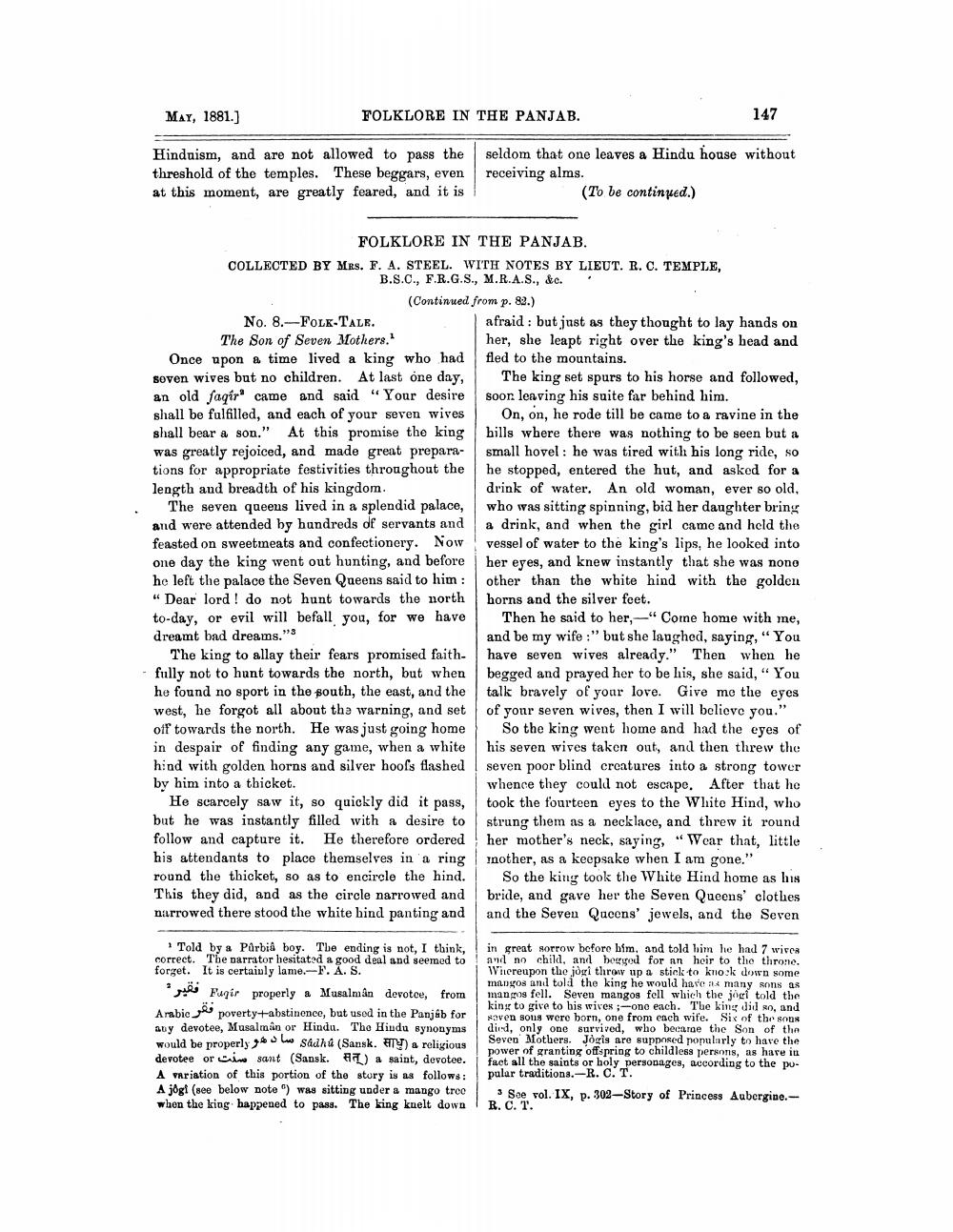________________
May, 1881.]
FOLKLORE IN THE PANJAB.
147
Hinduism, and are not allowed to pass the seldom that one leaves a Hindu house without threshold of the temples. These beggars, even receiving alms. at this moment, are greatly feared, and it is!
(To be continued.)
FOLKLORE IN THE PANJAB. COLLECTED BY MRS. F. A. STEEL. WITH NOTES BY LIEUT. R. C. TEMPLE.
B.S.C., F.R.G.S., M.R.A.S., &c.
(Continued from p. 82.) No. 8.-FOLK-TALE.
afraid: but just as they thought to lay hands on The Son of Seven Mothers.
her, she leapt right over the king's bead and Once upon a time lived a king who had fled to the mountains. soven wives but no children. At last one day, The king set spurs to his horse and followed, an old fagir came and said “Your desire soon leaving his suite far behind him. shall be fulfilled, and each of your seven wives On, on, he rode till be came to a ravine in the shall bear a son." At this promise the king bills where there was nothing to be seen but a was greatly rejoiced, and made great prepara- small hovel : he was tired with his long ride, so tions for appropriate festivities throughout the he stopped, entered the hut, and asked for a length and breadth of his kingdom.
drink of water. An old woman, ever so old, The seven queens lived in a splendid palace, who was sitting spinning, bid her daughter bring and were attended by hundreds of servants and a drink, and when the girl came and held the feasted on sweetmeats and confectionery. Now vessel of water to the king's lips, he looked into one day the king went out hunting, and before her eyes, and knew instantly that she was nono he left the palace the Seven Queens said to him : other than the white hind with the golden “Dear lord ! do not hunt towards the north horns and the silver feet. to-day, or evil will befall you, for we have Then he said to her, -" Come home with me, dreamt bad dreams."'S
and be my wife :" but she laughed, saying, "You The king to allay their fears promised faith- have seven wives already." Then when he fully not to hunt towards the north, but when begged and prayed her to be his, she said, “ You he found no sport in the south, the east, and the talk bravely of your love. Give me the eyes west, he forgot all about the warning, and set of your seven wives, then I will believe you." off towards the north. He was just going home So the king went home and had the eyes of in despair of finding any game, when a white his seven wives taken out, and then threw the hind with golden horns and silver hoofs flashed seven poor blind crcatures into a strong tower by him into a thicket.
whence they could not escape. After that he He scarcely saw it, so quickly did it pass, took the fourteen eyes to the White Hind, who but he was instantly filled with a desire to strung them as a necklace, and threw it round follow and capture it. He therefore ordered her mother's neck, saying, "Wear that, little his attendants to place themselves in a ring nother, as a keepsake when I am gone." round the thicket, so as to encircle the hind. So the king took the White Hind home as his This they did, and as the circle narrowed and bride, and gave her the Seven Queens' clothes narrowed there stood the white bind panting and and the Seven Queens' jewels, and the Seven
Told by a Půrbid boy. The ending is not, I think, correct. The narrator hesitated a good deal and seemed to forget. It is certainly lame.-F. A. S.
Fugir properly a Musalman devotee, from Arabic poverty+abstinence, but used in the Panjab for any devotee, Musalman or Hindu. The Hindu synonyms would be properly sw Sadhů (Sansk. ETY) a religious devotee or in sant (Sansk. ) a saint, devotee. A variation of this portion of the story is as follows: A jogt (see below note) was sitting under a mango treo when the king happened to pass. The king kuelt down
in great morrow before him, and told him he had 7 wirca and no child, and beyod for an heir to the throne. Wincreupon the jogi throw up a stick to knock down some mangos and told the king he would have many sons as mangos fell. Seven mangos fell which the jogi told the king to give to his wives ;-one each. The king did so, and saven sous were born, one from each wife. Sic of the sous dird, only one survived, who becarge the Son of the Seven Mothers. Jogis are supposed popularly to have the power of granting offspring to childless persons, as have in fact all the saints or holy personages, according to the pupular traditions.-R.C.T.
3 See vol. IX, p. 302-Story of Princess Aubergine.R.C.T.




